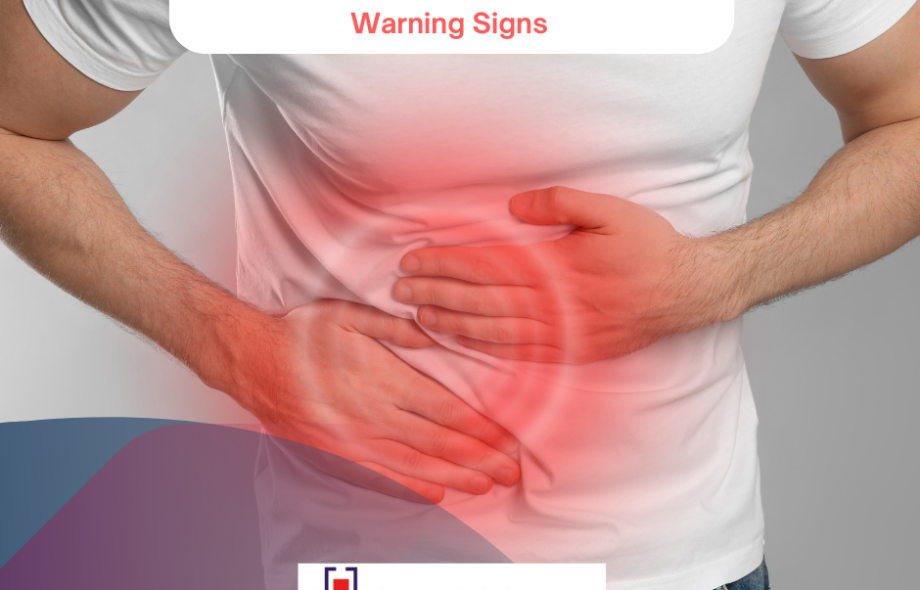Introduction
Appendicitis is a serious medical condition that requires immediate attention. It occurs when the appendix, a small tube attached to the large intestine, becomes inflamed. If left untreated, it can lead to life-threatening complications like a ruptured appendix. Identifying the Warning Signs of Appendicitis early can prevent serious health risks. In this article, we will discuss the symptoms, causes, and when you should seek emergency care.
1. Persistent Abdominal Pain
Caption: “Abdominal pain can be an early indicator of appendicitis.”
Alt text: “A person holding their lower right abdomen in pain.”
One of the earliest and most common symptoms of appendicitis is abdominal pain. The pain often begins near the belly button and gradually shifts to the lower right side of the abdomen. It becomes sharper and more intense over time, especially when moving, coughing, or applying pressure to the area.
2. Loss of Appetite
Caption: “A sudden loss of appetite may indicate an underlying issue like appendicitis.”
Alt text: “A plate of untouched food with a fork resting on the side.”
Many people with appendicitis experience a sudden loss of appetite. If you find yourself unable to eat or feeling nauseous after meals, this could be a warning sign of inflammation in the appendix.
3. Nausea and Vomiting
Caption: “Feeling nauseous and vomiting? It might be more than just a stomach bug.”
Alt text: “A woman leaning over a sink, appearing to be nauseous.”
Nausea and vomiting often accompany appendicitis. This happens because the body is reacting to inflammation and infection in the appendix. If these symptoms occur alongside abdominal pain, it is important to seek medical attention.
4. Fever and Chills
Caption: “A mild fever can escalate if appendicitis worsens.”
Alt text: “A person with a thermometer in their mouth, looking unwell.”
A low-grade fever (99-100°F) is common in the early stages of appendicitis. As the infection worsens, the fever may rise above 101°F, accompanied by chills and body aches. A high fever could indicate that the appendix is about to rupture.
5. Bloating and Inability to Pass Gas
Caption: “Feeling bloated and unable to pass gas? It could be appendicitis.”
Alt text: “A person clutching their stomach due to bloating and discomfort.”
Appendicitis can cause bloating and an inability to pass gas or have a bowel movement. This happens because inflammation in the appendix disrupts normal digestion and can lead to an intestinal blockage.
6. Diarrhea or Constipation
Caption: “Changes in bowel habits may signal appendicitis.”
Alt text: “A person sitting on a toilet, looking uncomfortable.”
Some individuals with appendicitis experience diarrhea or constipation. This symptom, when combined with severe pain, nausea, or fever, should not be ignored.
7. Painful Urination
Caption: “Appendicitis can sometimes cause urinary discomfort.”
Alt text: “A person in distress near a restroom door.”
Inflammation from appendicitis can irritate the bladder and cause painful urination. If you notice urinary issues alongside other symptoms, seek medical attention immediately.
When to See a Doctor
If you experience any of the above symptoms, especially persistent lower right abdominal pain, visit an emergency room immediately. Delaying treatment can lead to a ruptured appendix, which is life-threatening.
Risk Factors for Appendicitis
Age: Common in people between 10-30 years old.
Family History: A family history of appendicitis increases risk.
Diet: Low-fiber diets may contribute to appendicitis.
Treatment Options
Appendectomy: The surgical removal of the appendix is the most effective treatment.
Antibiotics: In some cases, antibiotics can help manage mild infections.
FAQs
1. Can appendicitis go away on its own?
No, appendicitis does not resolve without medical treatment. If left untreated, it can lead to severe complications.
2. How quickly does appendicitis progress?
Symptoms can worsen within 24 to 48 hours. Seek medical attention as soon as symptoms appear.
3. What should I do if I suspect appendicitis?
Go to an emergency room immediately. Do not eat, drink, or take painkillers before seeing a doctor.
4. Can appendicitis be prevented?
There is no guaranteed way to prevent appendicitis, but maintaining a high-fiber diet may help reduce the risk.
5. What happens if the appendix bursts?
A ruptured appendix can cause a serious infection called peritonitis, which requires urgent medical intervention.
 :
https://coppellemergencyroom.com
:
https://coppellemergencyroom.com












